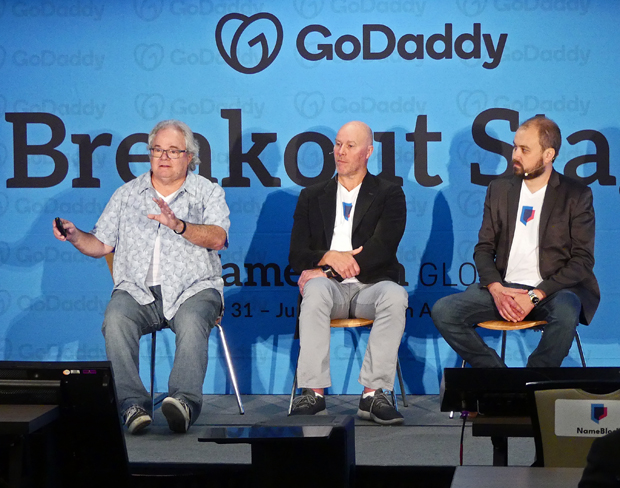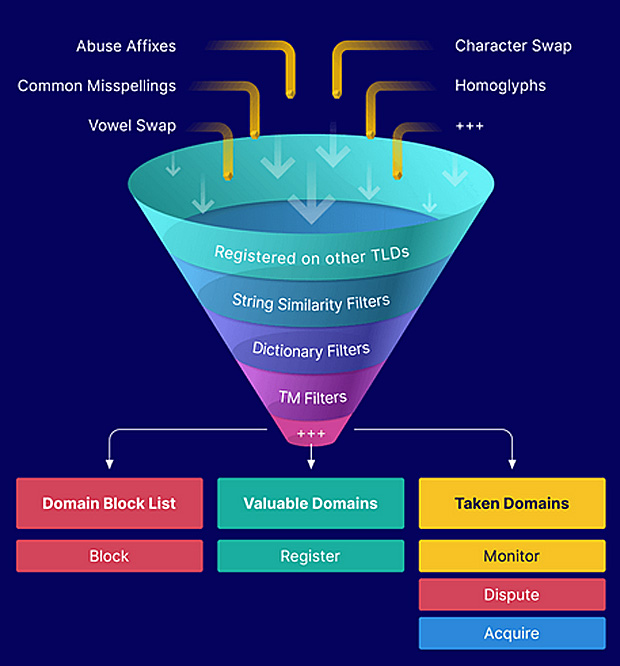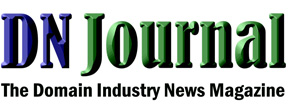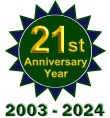|
That
initial trepidation quickly evolved into appreciation
as I learned that NameBlock is an innovative new
tool that actually helps insure that web
users DO connect with you rather than some bad
actor trading on your name. As a side benefit, I also
learned the service can also be a source of new
revenue for registrars, registries, brokers,
attorneys and other industry professionals. OK, now
we're talking!
Considering
the people who are behind the product, I should have
known from the start that something good was in
the works. NameBlock was founded by Rolf
Larsen, who previously founded the
.global domain registry that he and his team
turned into a new TLD success story that led to
Afilias acquiring the enterprise in 2019.
Rolf also co-founded and continues to serve as
Chairman of iQ
Global (a provider of cybersecurity,
business intelligence, consulting and DevOps services
for the domain industry) and leads several other enterprises
as well. His Senior Vice President at iQ, Pinky
Brand (whose rich industry resume goes all the way
back to the 1990s!) has taken on the same role at
NameBlock, The all-star team helping guide the new
service, as well as use it in their own
business, also includes ShortDot
SA Founder and CEO Lars Jensen and
ShortDot Co-Founder & COO Kevin Kopas. Kevin
is also a NameBlock board member and is serving as
their Senior VP of Business
Development.

Introducing
NameBlock at the 2023 NamesCon Global conference
in Austin
are (left to right), Pinky Brand, Rolf
Larsen and Kevin Kopas.
NameBlock
was created to solve a problem that has been bedeviling
businesses with an online presence since the domain
name system was born - that of bad actors registering confusingly
similar domains in an effort to siphon traffic
away from legitimate sites and send unwary
consumers to bogus sites where a variety of scams,
malware and other assorted ills are often waiting for
them. For decades that has resulted in an endless game
of whack-a-mole in which a new threat pops up as soon
as an old one is shut down. That led Larsen to wonder
"what if there was a way to prevent domains
whose only purpose is to deceive from being registered
in the first place?" In NameBlock he and his
teammates may have found a way to turn that seemingly
impossible dream into a reality.
They
started by using sophisticated machine learning
algorithms to create a database, called the iQ
Threat Intelligence Repository, that allows
NameBlock to identify and block the most common
terms used to conduct phishing, spamming and other
forms of DNS abuse. That allows them to examine a
domain name and determine the most likely forms
deceptive names would take through typos, homonyms,
substituting a single character (like a zero for the
letter O), etc. With that information, which is the
foundation for NameBlock's Abuse
Shield, participating registry operators
in any TLD can then automatically block
all of those permutations from being registered at
all.

AbuseShield is able to identify and block
only the variants that would otherwise be used for
abuse. Up to 500 variants will be generated, consisting of homoglyphs, abuse suffixes
& common misspellings.
NameBlock
is easy for the registries to integrate and they don't
lose any meaningful revenue because what they are sealing
off is basically a dead zone littered with names
that would only be created for the purpose of DNS
abuse if they were registered. Conversely, their
share of NameBlock registration fees could have a very
positive impact on their overall revenues.
Rolf
Larsen noted, "NameBlock aims
to fill a gap in the domain protection and DNS abuse
space. Our Abuse
Shield
and BrandLock
product levels ensure that all business name
variations are blocked across domain extensions
enrolled with NameBlock, , thus securing the name from
abuse. We aim to make the Internet safer and more
secure, and we are certain that NameBlock is the
perfect instrument to do it."
Of
course, how much protection a given registrant
may want or need will vary from one to
another, so NameBlock is offered as an add-on
product to a domain registration. So when
you register a name at a participating
registrar, you will be able to add the
NameBlock service at the same time if you want
it. You can
also renew it (or drop it) at the same time you
renew your domain. In exactly the same way
that registrars set their own retail prices
for domains, they can set the price they want
to charge for NameBlock (the need to compete
in the crowded domain registration field
should keep pricing at attractive levels).
I
mentioned at the top that Nameblock creates new
revenue opportunities for entrepreneurs beyond
registries and registrars. Brokers, brand
consultants, attorneys and others can sign up
as
|

|
|
NameBlock resellers and offer the
service in conjunction with domains they
are helping clients acquire and/or protect.
That is why the company refers to NameBlock as
A Marketplace for Domain Name Blocking
- there is room for buyers and sellers of all
kinds to utilize the service.
Lars
Jensen's ShortDot SA, a domain registry
operator, has put their TLDs in the
NameBlock system. Lars noted, "NameBlock is a
revolutionary domain protection service that makes it
possible for startups and young businesses to block
their domain name without needing a trademark.
It is a fantastic value to registrants, a great
product offering for registrars it reduces abuse on
the DNS. Everybody wins!"
While
the term "domain name blocking" had my
Spidey senses tingling a little at first, they made a
180 degree turn after I got a look under the NameBlock
hood. Just as blocking is a positive - actually
critically important - part of football, this
blocking service may go a long way toward fixing a
problem we have all been dealing with for far too
long.
|
|





